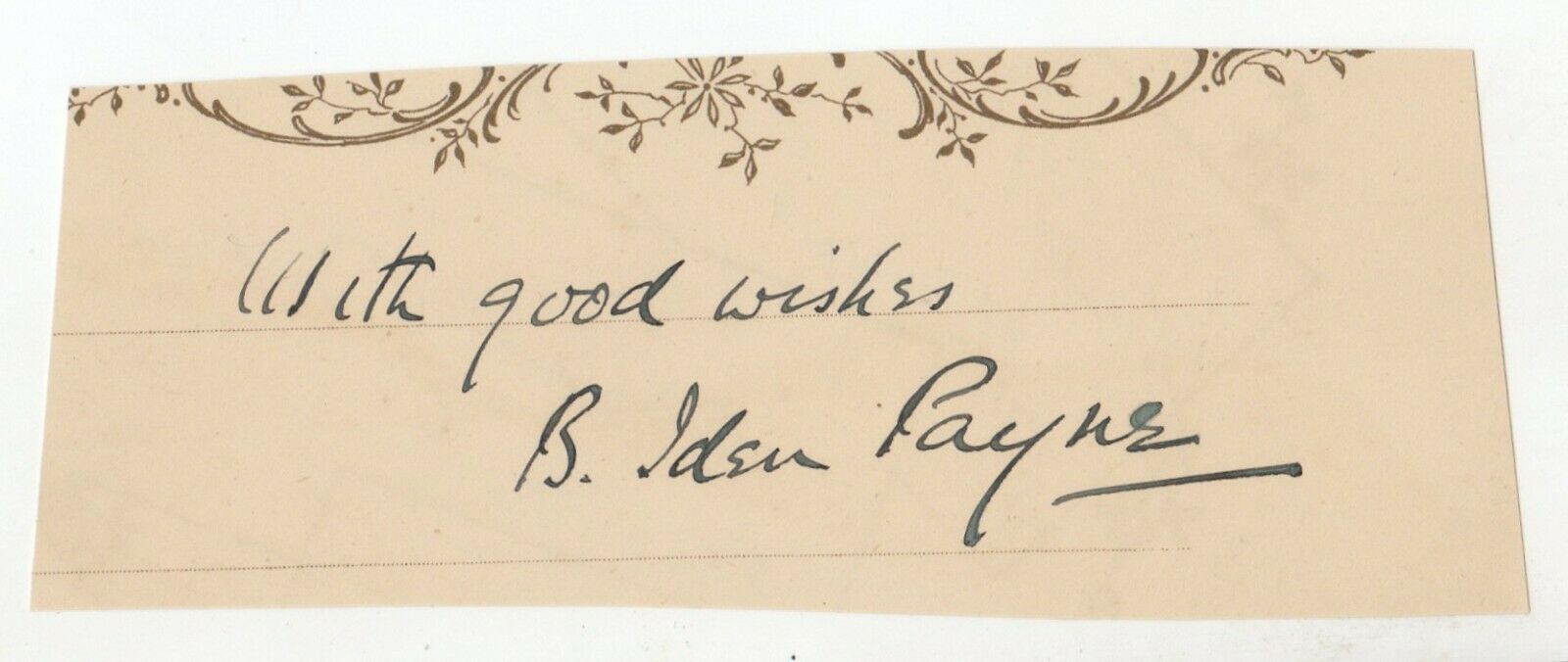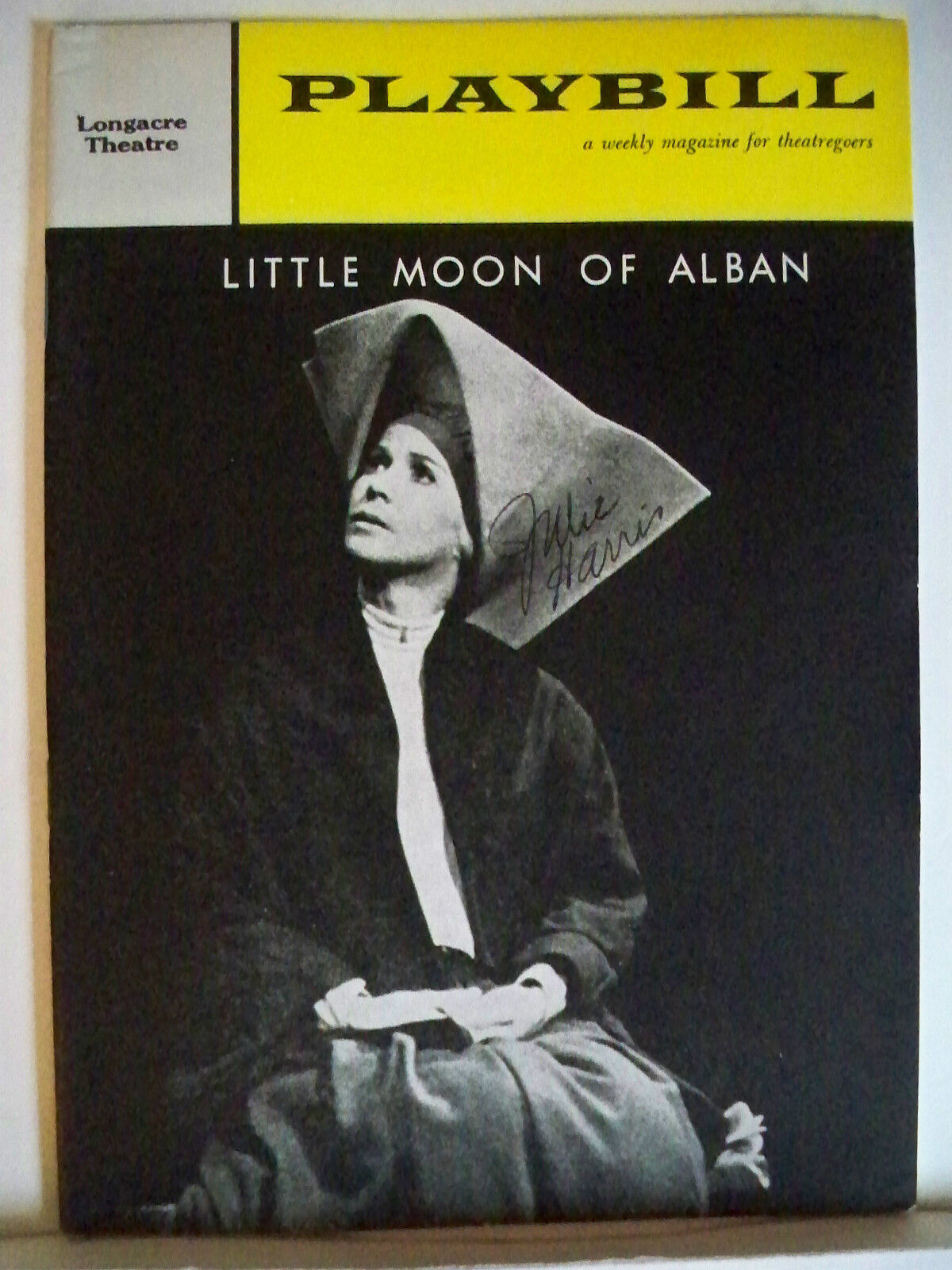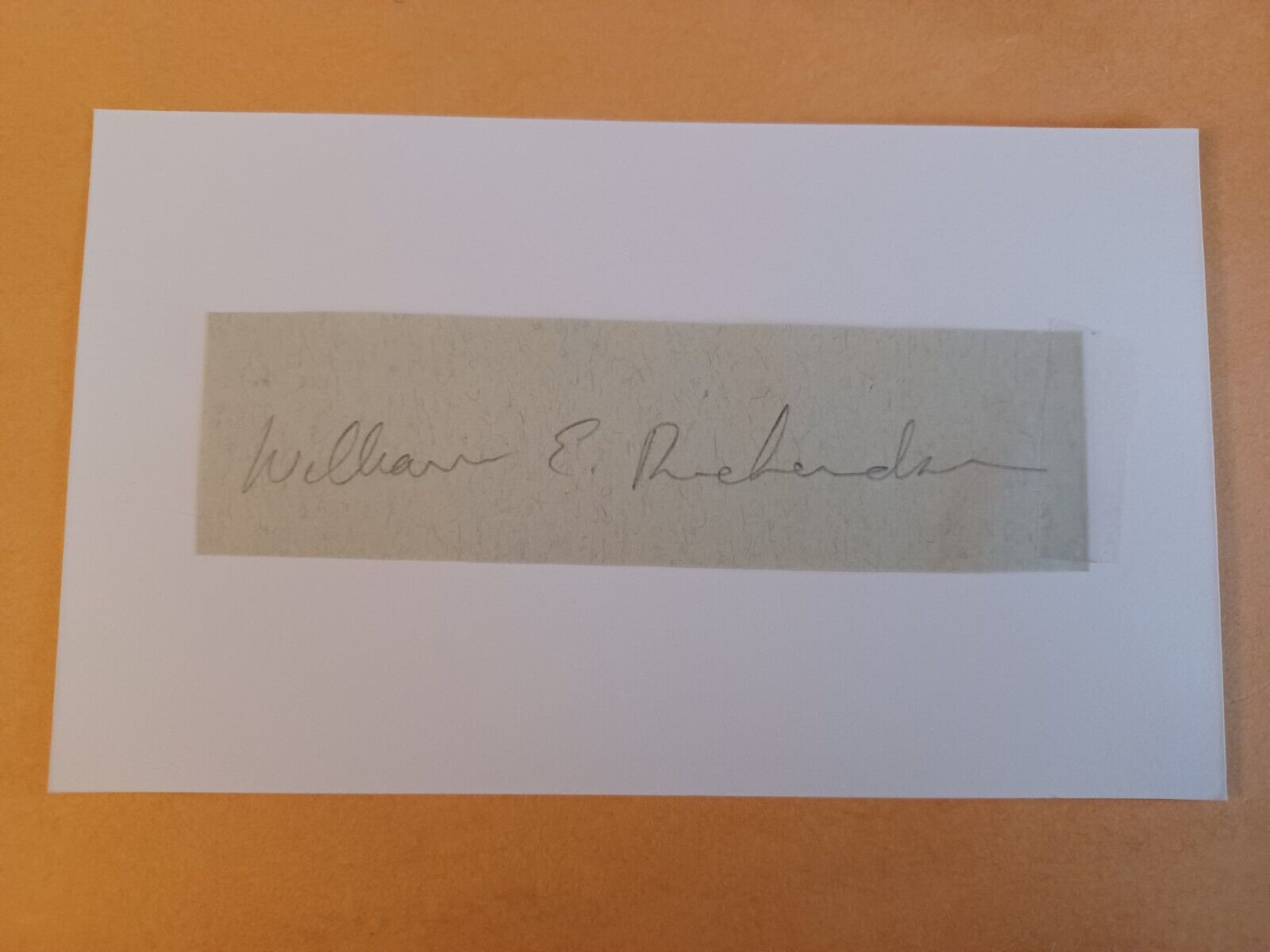-40%
Ben Iden Payne Cut Signature! Autograph! Repertory Theatre! Shakespearean Actor
$ 20.06
- Description
- Size Guide
Description
Ben Iden Payne Cut SignatureThis listing is for a piece of paper HAND SIGNED by Ben Iden Payne. Flat signed by Ben Iden Payne. Also signed by another actor Alfred S. Barber on the back. Autograph is hand signed and guaranteed authentic. This is a great piece of Theatre History! Happy Bidding!
Payne was an English actor, director and teacher. Active in professional theater for seventy years, he helped the first modern Repertory Theatre in the United Kingdom, was an early and effective advocate for Elizabethan staging of Shakespeare plays, and served as an inspiration for Shakespeare Companies and University theater programs throughout North America and the British Isles. His name lives on as the name of a theater at the University of Texas as well as annual theater awards presented in Austin, Texas. Born September 5, 1881, in Newcastle-on-Tyne, he was raised and educated in Manchester. He was the youngest of four children. His father, a Unitarian minister, died at age 52, when Payne was eleven years old. As a young child, the first Shakespeare play he saw was a touring production of Twelfth Night. Too young to understand much of the play, he described himself as being "enchanted" by the actress who played Viola. During his second year at the Manchester Grammar School he appeared in his first Shakespearean role, as Bassanio in The Merchant of Venice. Soon thereafter, he saw a production of the same play performed in Manchester by the touring company of Henry Irving, one of the great nineteenth-century Shakespearean impresarios. Mr. Irving played Shylock and Ellen Terry performed as Portia. Modified Elizabethan Staging theory Payne’s most recognized achievement is his method of staging Elizabethan drama, which he called “modified Elizabethan staging.” Inspired by the founder of the Elizabethan Stage Society, William Poel, Payne’s taste for Elizabethan staging was meant to draw on actual Elizabethan period stages. The basic premise of this method was that an audience member should feel that “he [or she] was sharing in the action—not looking at something outside himself”. This could be achieved by creating a more intimate space, where the audience was not separated from the actors by “the proscenium arch, footlights, or orchestra pits”. Additionally, audience members were, according to this method, better able to focus in on the actors and the play itself when they were not distracted by “falling curtains, blackouts, planned pauses for resetting scenery…or any other forced interruption” of the action of the play. This method became instrumental in how Payne staged Shakespeare and he utilized it throughout his career. First professional work While still in school, he started his career as a walk-on actor in 1899 at the F.R. Benson company, a renowned touring Shakespeare company (formal name: Mr. and Mrs. R. F. Benson's Shakespearean and Old English Comedy Company. Upon being interviewed by Frank Benson, he was introduced to Mrs. Benson; he was astonished to see she was the actress who played Viola in the traveling production of Twelfth Night he had seen as a child. After a four-week trial engagement with Benson, Payne spent a season touring Britain with a much smaller company, Mademoiselle Gratienne. He returned to Benson the next year, but this engagement was cut short when a fire at the Theatre Royal in Newcastle upon Tyne destroyed the company's stock of scenery and costumes. Payne signed on with the touring troupe of Carlyon and Charlton, a "fit-up" company (fit-up meaning they traveled with their own stage proscenium, stage curtains, lighting and scenery, which could be installed in any open hall and did not require a formal theater for performances). In 1902, he returned to Benson, where he worked both as an actor and an assistant stage manager, his first non-acting theatrical experience. He toured with Benson and several other companies the next several years, performing Shakespeare in Jamaica with the Benson Company, participating in the first production (staged by the Arthur Hare Company) of The Importance of Being Earnest performed after the trial and imprisonment of Oscar Wilde, as well as working with the companies of Mr. and Mrs. A.B. Tapping, Norman V. Norman, Madge McIntosh and the Shakespearean actor Ian Maclarean. During that period, he married the actress Mona Limerick; they had three children. Payne's wife, Mona Limerick Stage director at the Abbey Theatre As the tour with McIntosh petered out, Payne interviewed with the famous director and producer, Harley Granville-Barker. Granville-Barker referred him to Cyril Keightley, who took him on tour to Ireland. Shortly thereafter, and unexpectedly, Payne was approached by William Butler Yeats, one of the Directors of the Abbey Theatre, Dublin. Unknown to Payne, Granville-Baker had recommended him for the position; equally unknown to him at the time, the English financial patron of the Abbey, Annie Horniman, insisted on an English professional stage manager as a condition for a three-year subsidy she was making to the theater. Payne met with Yeats and the other two directors of the Abbey, Lady Gregory and J.M. Synge, for an interview the weekend that Synge's masterpiece, The Playboy of the Western World, opened. Payne was in the first row of the audience when the famous "Playboy" riots broke out in the house, with audience members breaking out in a pandemonium of shouting during the second half, over the alleged scandalous content of the play. Payne was engaged as stage director of The Abbey Theatre, but with strict instructions that he was not to participate in the production of Irish folk plays. Payne was not aware at the time that his employment was made at the insistence of Horniman, nor that Lady Gregory and Synge were opposed to bringing in a British play director to the Irish National Theatre. The engagement lasted only a few months; after taking the company on a British tour from Glasgow, Scotland to London, Payne resigned his position. He maintained a friendship with Yeats. Manchester Repertory Company The day after resigning his position with the Abbey, he received a note from Horniman, the Abbey patron. She was unhappy with her relationship with the Irish National Theatre (the unhappiness was mutual) and she wanted to sponsor a new theatrical venture, under Payne's direction. Payne proposed establishing a repertory company in Manchester, a major provincial city in England and Payne's boyhood home. With Horniman's funding he established the Manchester Repertory Company, the first true repertory company in theatre in England. He directed many of the early plays of George Bernard Shaw and John Galsworthy. In 1907, Payne used William Poel to direct Measure for Measure, by William Shakespeare, with the Manchester Repertory Company. Poel was an early-twentieth-century innovative advocate of producing Shakespeare plays as written, without the heavy scenery and butchered text of grand nineteenth-century productions by the likes of Henry Irving. Poel's production at Manchester Repertory may have been his best, as Payne had cast it with talented, professional actors, and not the amateurs Poel usually worked with. The next year, Payne produced Shakespeare's Much Ado About Nothing as a Christmas play at Manchester. To keep the pace of the play flowing, without long interruptions during scene changes, he staged played connecting scene in front of a neutral curtain drawn across the proscenium. This was an early experiment in staging Shakespeare plays as continuous action, as was the style at the Globe Theater when the plays were first written and produced. Payne resigned as director of Manchester Repertory in 1911, both for personal reasons (his wife, Mona Limerick, did not get along with Horniman) and because he believed new management could produce more popular plays that might stem the red ink of the operation. Coming to America In 1913, Payne was invited to the United States to organize a season of modern plays for the Chicago Theatre Society, a pioneering community theater. He had been referred to that company by Horniman. The Society produced a repertory season of plays by Shaw and Galsworthy, as well as a conventionally staged production of Measure for Measure. In February 1914, he produced a series of plays in Indianapolis for the Drama League of America. The next year he directed a little theater company in Philadelphia. Carnegie Tech While in Chicago, Kenneth Sawyer Goodman, the namesake of the Goodman Theatre, introduced Payne to Thomas Woods Stevens and Dr. Arthur Hamerschlag. Dr. Hamerschlag was the first President of Carnegie Institute of Technology (now Carnegie Mellon University) and Stevens was the first chairman of the Department of Drama there, the first professional drama department in a university. Payne directed You Never Can Tell, by George Bernard Shaw during the department's first year of operation. Payne was associated with School of Drama at Carnegie Tech from 1914, and two years later he first directed the annual Shakespeare play, to 1950, excepting the Stratford years of 1935–43. While at Carnegie Tech he tried out Poel's concept of Shakespeare productions performed on English Renaissance theatre stages, without elaborate scenery, by staging an annual Elizabethan production there. At Carnegie they had first used elaborate scenery for Shakespeare plays, but Payne discovered that the more they simplified the scenery the better it was for the production and the more immediate was the appeal to the audience. In 1925 Stevens departed Carnegie to manage the newly created Goodman Theatre in Chicago, and Payne succeeded him as Chairman of the Drama Department. During first year as chair in 1925, he directed a production of Shakespeare's Hamlet fully using the staging technique he came to describe as "modified Elizabethan staging". He left the Chair of the Drama Department in 1928, but Payne returned every year through 1951 (except for the years at Stratford), directing 58 plays at Carnegie between 1914 and 1951, 26 of them by Shakespeare. Broadway career In 1915, Payne produced the first staging of Hobson's Choice by Harold Brighouse for The Shubert Organization. In 1916 he directed John Barrymore in his first success in a serious role, in the American premiere of Justice by John Galsworthy. According to Angus L. Bowmer, founder of the Oregon Shakespeare Festival, a financial backer demanded that Barrymore be replaced, fearing a disastrous drinking binge. Payne replied, in effect, that if they replaced Barrymore they would have to find a new director. Barrymore stayed and the performance launched his career. Justice had been produced by John D. Williams, press agent for Charles Frohman. In 1917, Payne accepted a position as a stage director of the Charles Frohman Company, a leading American producing organization. Payne would split his time between directing professionally in New York City and directing students at the School of Drama at Carnegie Tech, sometimes preferring the attitude and commitment of his "apprentice actors" in Pittsburgh to his professional actors on Broadway. Payne was unhappy with the work at Frohman, with its emphasis on type casting, and a 'star system' where engaging a celebrity actor (who cared more about their own performance than the good of the play as a whole) was the main concern, and he left in 1923. He returned to Broadway in 1943 to direct several plays for the Theatre Guild of New York.
If specifically requested by the buyer, we offer a serial numbered store Certificate of Authenticity. More importantly, our store also fully guarantees every signature we sell. Any signature that is rejected from a major authenticator can be returned for a full refund including return shipping costs. If you have any questions, feel free to send us a message.
Combined shipping in the USA is only $.75 per extra "similar" item and is automatically calculated at checkout. We offer paid Priority Shipping alternatives on all Items. All international orders use the eBay Global Shipping Program.
I reserve the right to re-list the item if payment has not been received within the agreeable amount of time. If you have any questions, please message me at your earliest convenience. Feedback is always reciprocated after the buyer leaves his feedback indicating satisfaction as well as receipt of items.
.
.
.
.
.










